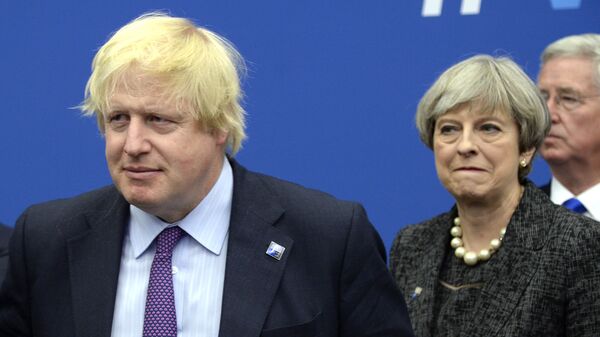Theresa May’s office attempted to keep sensitive intelligence from Boris Johnson when he took over as foreign secretary, BBC reports, citing anonymous sources with knowledge of the matter.
In Britain, the prime minister chairs the National Security Council, which oversees national security, intelligence, and defence matters, but day-to-day responsibility for the foreign intelligence service, MI6, and the eavesdropping agency, GCHQ, lies with the Foreign Office.
It is understood, however, that the prime minister wanted Johnson to be denied access to a category of secret data after his appointment in July 2016.
Given that the foreign secretary is responsible for authorising intelligence-gathering operations, this move is thought to have raised concerns among the secret services that a lack of knowledge about some of the intelligence could affect Johnson’s ability to make well-balanced decisions regarding such sensitive operations.
One source was quoted as saying that Johnson himself was "very unhappy" with the decision.
Some sources explained it by citing the "control freakery" of Downing Street, while others said it was a "combination of everyone's faults", such as nervousness over Johnson's “lack of discipline” and differences between him and Theresa May.
However, no clash followed, according to the report, and Johnson was shown everything “he needed to see” from the first day at his post – although it is unclear whether it means Johnson saw all the intelligence.
He resigned as foreign secretary last July over strong disagreements with Theresa May over her handling of Brexit. In his resignation letter, he lamented that the country was “truly headed for the status of a colony” and that the “Brexit dream was dying”.
Johnson is now one of the two last men standing in the Conservative Party leadership race, alongside the incumbent foreign secretary, Jeremy Hunt.
Whoever wins the Tory leadership contest is also set to replace Theresa May as prime minister. The next PM is expected to be chosen in the week of 22 July.
An ardent Brexiteer, Johnson has been vocal in his willingness to withdraw Britain from the European Union. “We are getting ready to come out on 31 October. Come what may,” he said in one of his recent interviews.
Johnson pledged to snub Theresa May’s hard-fought withdrawal agreement bill, which failed to garner enough support in parliament to become a law, and said he would attempt to negotiate a new divorce bill. His do-or-die approach, however, has sparked concerns among some voters that if he failed to reach another deal with Brussels, the UK would crash out of the union without a deal in place, which would entail serious economic ramifications.




